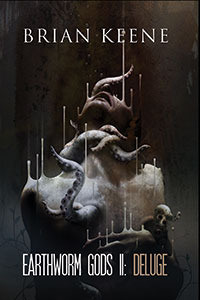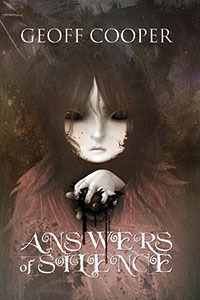Brian Keene's Blog, page 158
August 27, 2012
Talking Alone
Last week, Robert Swartwood interviewed me about Alone, my first foray into self-publishing, which debuted in digital this past weekend. (Currently it’s available for $2.99 on Kindle and Kobo — the Nook edition should be out later this week). The interview veers into other topics, too, like zombies, the small press, and the very probable eventual death of paperbacks. Listen for free here.
August 24, 2012
ALONE
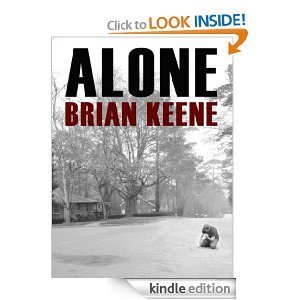 Some time ago, Glen Krisch challenged me to try self-publishing. So now I have.
Some time ago, Glen Krisch challenged me to try self-publishing. So now I have.
ALONE, a short novella of quiet, supernatural horror, was previously only available as a signed limited edition. So that those copies will hold their value for collectors, I decided to re-release it only in digital, rather than in paperback. Currently, it’s on Kindle for $2.99. Nook and Kobo editions should be on sale within the next 72 hours.
MAELSTROM III SHIPS!
August 22, 2012
Keene On Kobo
Although most of my work is available on Kindle and Nook, Kobo owners have despaired over its unavailability for their devices. Well, now Kill Whitey, The Damned Highway, and Shades are all available for Kobo.
A Grim, Bleak, and Nihilistic Happy Place
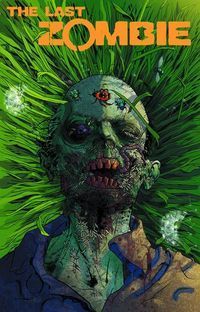 My contributor copies of The Last Zombie: Before the After #1 arrived yesterday. Mary read it last night and commented on how grim it was. I told her that was merely the set-up, and that things were about to get very bad for our characters.
My contributor copies of The Last Zombie: Before the After #1 arrived yesterday. Mary read it last night and commented on how grim it was. I told her that was merely the set-up, and that things were about to get very bad for our characters.
In truth, this new story-arc, and the story-arc that will follow, contain what I feel is some of the bleakest and most nihilistic stuff I’ve ever written. Ian’s continuing deterioration and the subsequent catalyst it provides for a final showdown between him and Federman, Russo and Ananti’s flashbacks (which involve everything from spousicide to a zombie chewing its way through a maternity ward), the loneliness expressed by Planters and Fulton in response to Johnson’s new relationship, the madman who now runs Chicago — these are characters and situations with decidedly unhappy endings.
It’s been a long time since I’ve reached down inside myself and dug for ore in the pathos mines. Those mines used to be easy to find and work. The darkness inherent in The Rising, Dark Hollow, Take the Long Way Home, and Ghoul came from personal, autobiographical experiences. I was younger then, so much of the ore was still fresh, barely buried beneath the surface, and therefore easy enough to dig up and expose. Then there were books like City of the Dead, Earthworm Gods, and Dead Sea, where the hopelessness on display was offered with a smile, a wink, and a nudge — “Hey kids, I know this hurts, but remember, it’s just make believe.” But even those wink-nudge novels, when I go back and look at them, had some very real nuggets of personal pathos at their core.
For a while, I thought the mines had gone dry. Nate Southard commented on this to me a few months ago, postulating that from Ghost Walk to A Gathering of Crows, my fiction became less personal, and almost “happier” (or as close to happy as it gets in my mythos). Entombed was a return to the pathos mines, although I personally feel I dug too deep with that one, something readers of the hardcover seem to have so far disagreed with (we’ll see how the rest of you feel when Entombed comes out in paperback and digital next month). Although, as I write this (sitting in my kitchen, drinking coffee, and musing about these things while Jamestown’s acoustic cover of U2’s “Red Hill Mining Town” competes in the background with the sound of crickets outside), I don’t know that digging too deep was the problem I felt with Entombed. I think perhaps it was more, “Okay, this is it, readers. This is all I have left to offer. This shall be our final covenant.”
Yes, I think that’s it exactly. Because after Entombed, I really did think the pathos mines had gone dry, and as a result, the books I’m currently working on (The Lost Level, With Teeth, and Hole In the World) read much more like that happy era that Nate Southard referenced.
So when I began this latest story-arc for The Last Zombie, and realized what was going to happen and where it was going to go, and how I was going to have to invest you, the reader, in it and make you feel it, I returned to the mines and poked around with my shovel until I found some new veins to supply the ore.
Trust me, you will feel it. You will hurt. I certainly have, in the process of writing it. And I also know that when I’m feeling that way while writing, that’s when I’m happiest.
Because that’s where the best stories come from. My happy place…
If you haven’t yet tried The Last Zombie, all of the back issues (as well as the trade paperback collections which reprint those issues) are available for purchase HERE (and are listed in order). Catch up on it now, and you can hurt along with everyone else in the coming months.
August 21, 2012
The Last Zombie: Before the After #3
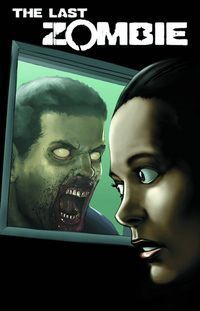 The Last Zombie: Before the After #3 is up for pre-order. Ask your local comic shop to reserve a copy for you, or purchase it online here.
The Last Zombie: Before the After #3 is up for pre-order. Ask your local comic shop to reserve a copy for you, or purchase it online here.
As the snow outside deepens and the team members continue to reveal their secrets to one another, Ananti tells Ian what happened to her loved ones and how she survived the zombie apocalypse.
Back issues of the entire The Last Zombie series can be purchased here.
August 20, 2012
SUNDANCING: Chapter 1
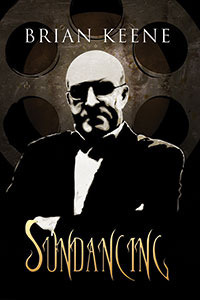 Maelstrom set 3 is on sale now and ships this week. Included in this set are Geoff Cooper’s long-awaited and decade-in-the-making collection Answers of Silence, my novel Earthworm Gods II: Deluge, and my meta-fictional novella Sundancing. That’s three beautiful, signed, limited edition hardcover books for $125. It should also be noted that while Earthworm Gods II: Deluge will eventually be reprinted in paperback and digital, this is the only edition of Sundancing that will ever be published. The only way to get it is to buy this set. And if you’re still on the fence about that, here’s the first chapter of Sundancing for free. Read it and decide.
Maelstrom set 3 is on sale now and ships this week. Included in this set are Geoff Cooper’s long-awaited and decade-in-the-making collection Answers of Silence, my novel Earthworm Gods II: Deluge, and my meta-fictional novella Sundancing. That’s three beautiful, signed, limited edition hardcover books for $125. It should also be noted that while Earthworm Gods II: Deluge will eventually be reprinted in paperback and digital, this is the only edition of Sundancing that will ever be published. The only way to get it is to buy this set. And if you’re still on the fence about that, here’s the first chapter of Sundancing for free. Read it and decide.
ONE
Ninety-Nine Percent Truth… How Old People Party… Winter Of Discontent… The Ark… Let’s Hear It For The Mayans… Better To Burn Out… Sundancing…
My name is Brian Keene and I write things for a living. Books, stories, essays, articles, and comic books. Fiction and non-fiction. Horror, mostly, although I’ve also delved into crime, westerns, science-fiction, superheroes, politics, and other categories and genres. And occasionally, albeit rarely, I write things like this book you are reading now—a stream of consciousness true story disguised as meta-fiction so that I don’t get anyone else in trouble, or piss someone off, or get sued, or sometimes all three. The last time I wrote such a thing, it was a novella titled The Girl on the Glider. That was a true story masquerading as a fictional ghost story, and when fans and readers asked me which parts of it were true, I replied “ninety-nine percent of it”. And I wasn’t lying.
This book is like that. The tale you are about to hear is ninety-nine percent true. I’ve changed some names in order to avoid those three things mentioned above, but other than that, the events I’m recounting really did happen.
This is a book about how old people party.
This is a book about armor and defenses, and what it really takes to remove that armor and let those defenses down. It’s a book about acquired wisdom and new questions. It’s a story about transition and change, and expectations and illusions. It’s a story about love and loathing, happiness and hate. It’s about self-immolation and ashes. There’s also a neat bit in which Mike Oliveri gets hit on by two B-list starlets, which leads to him almost getting killed by rapper and actor Ice-T’s entourage, but I’ll tell you more about that later.
Pink Floyd once sang about setting the controls for the heart of the sun. This is a story about how I tried to do that, and why, and what happened next.
* * *
It was late January, 2012, and so far, the winter had sucked. So had the two winters before that. In fact, all winters suck. I’ve never been a fan of winter. It’s a cold, bleak season of death. I was always more partial to spring, the season of renewal. And that January, renewal was something I desperately craved.
During those last three winters, I’d gone through a divorce, a year’s worth of weekly visits with a shrink, absolute financial destitution at the hands of a crooked publisher, a heart attack, two devastating floods, a mudslide, a blizzard, the deaths of several family members, betrayal and abandonment by several once-close friends, and two nervous breakdowns. My alcohol consumption had increased in response to this, and the amount of words I wrote each day had decreased accordingly. Not that I had time to write, even if I’d had the mental strength to do so. I had my youngest son from Monday through Thursday, and by the end of the day, he left me too exhausted to work. I saw my girlfriend, Mary, on the weekends, but visiting her involved a three hour commute, and again, there wasn’t much time for writing. Basically, as my world fell apart, brick by brick, I kept my shit together as a father and as a boyfriend, but couldn’t write to save my life. In the rare moments when I did have time to write, the words I produced weren’t my best, which made it even harder to write.
The public didn’t know this, of course. Oh, hell no. Online and during appearances at signings and conventions, I still played the role of the hard-working writer, preaching the gospel of how there was no such thing as writer’s block, and how all one had to do was make the time to write—ass in chair, fingers on keyboard. Repeat as necessary. Except that it was all hypocritical bullshit. I gave the genre what it wanted. What it needed. A pep talk in a time of crisis (and believe me, these last few years have indeed been a time of crisis for most of your favorite horror writers and publishers). But while I could rally the troops, I had no one to perk up my own sagging spirits.
No one except a very select few.
Several years ago, when the economy went south and readers stopped buying books and publishers stopped paying their authors, I built an Ark. Not a physical ark, of course. God didn’t tell me to go out in my backyard and build a ship and take two of every animal on it. This was a figurative ark. A promise of help and sanctuary.
I’ve been writing professionally for over fifteen years now, and something that took me a long time to learn was who my real friends were. I wrote about this at length some years ago—about having more hangers-on and acquaintances than real friends. That’s a hard truth to realize, and when it becomes clear, it’s pretty goddamn demoralizing. Worse are the people who are your friends only because of who you are and not because of who you are. There is a distinction there, and it’s one that anyone who enjoys a bit of fame or power (or both) can understand and commiserate with.
Once I’d finally learned to separate the wheat from the chaff, I treasured the few true friends I have even more. And that was why I built us an Ark.
You have to understand the situation. The economy kept getting worse and the apocalypse was upon us. It started in the small press. Once-reliable publishers were either late with the royalty payments or simply not paying at all. Then mass-market publishers began doing the same thing. Dorchester went out owing me over half of my annual income—we’re talking a mid-five figures sum. I suspected that the days of the mid-list, working writer were coming to a close. We were a dying breed. I have since been proven right. That’s why you now see so many writers, be they veterans or newbies, self-publishing their stuff via Kindle and Nook, or signing with “new deal” publishers like Deadite or Thunderstorm, who conduct business differently than their predecessors did, and offer better, more reliable terms for their stable of authors.
But before we all did that, I built the Ark. I promised my friends that I would use the status and power and connections I have amassed over the last fifteen years to help them out—to shelter and protect and guide them as the storm reached its fury. In return, they promised me the same. We watched each other’s backs and rode out the storm, watching for dry land. The stress took a toll on us all—divorces, health problems, bankruptcies. In my case, it was all three—a divorce, a heart attack, and a mountain of debt. But I survived, and came back stronger, and learned that I no longer feared death. Indeed, I was sort of ready for it. I mean, things were so goddamned bad that death was starting to look like a viable alternative. At least I’d get caught up on my sleep. I wouldn’t have to fight off the bill collectors or watch people pirate my hard work for free online. And although they never said it, I could tell that some of my friends aboard the ark felt the same way. They had the emotional auras of people who hoped and prayed that the Mayans were right, and that in another year none of this shit would matter anymore, because Earth would be a smoking cinder.
I began to have this fantasy that we were sailing the ark through space, and I was behind the wheel. I’d set a course for the heart of the sun and steer us right into that fucker. Instead of fading away or falling apart, we’d just burn out in one bright, big flare—and explosive finale befitting my generation’s equally explosive start in the genre all those years ago. Back when we didn’t know any better, and had such high hopes and dreams. Back before writing broke our hearts. Just dive right into the sun.
If it sounds like I had a death wish, well, I guess I might have, at that. I wasn’t consciously suicidal. Not at all. But I found a strange comfort in the idea of dying, simply because it meant I could escape all the bullshit. I didn’t want to kill myself, but if death happened to look my way, I’d reach out and shake its hand and maybe buy it a beer. The only real regret I’d have if I died was the sadness it would cause those who loved me—but for myself, it would be a chance to finally get some peace. And there was no better way to do that than a funeral pyre.
That fantasy became all I thought about. It was a wonderful dream.
Eventually, we found safe harbor. Salvation. For some, it was through digital and self-publishing. For others, it was with different, stronger publishers. For me, it was Hollywood.
Here’s how movie options work. Let’s say you write a book. Somebody in Hollywood—usually a producer—reads the book and thinks it would make a good movie. The producer then pays you a small sum to option the work. This means you are granting them permission to try to raise money and studio interest in a film version of your book. It does not, however, automatically mean that the book will become a movie. In fact, it’s quite the opposite. Most book-to-film adaptations never get past the option stage.
But suddenly, a whole bunch of mine did, starting with Ghoul. And when that happened, I suddenly wasn’t broke anymore. When Ghoul officially began shooting, I got a nice check. Unlike the recent checks from many of my publishers, it arrived on time, didn’t bounce, was for the amount it was supposed to be for, and paid off the mountain of debt I’d accrued over the last three years. The producers flew me out to the set, and I got to watch the movie being filmed. I was treated professionally. More importantly, I was treated like I mattered.
That’s all I ever wanted. To be treated professionally and to be paid what I was worth. And when it happened, my death wish vanished.
Things began turning around after that. Mary and I got more serious—an occurrence which shocked absolutely none of our friends or peers. She’d been one of my best friends for the last fifteen years, and we were both single, and both writers, and it seemed like the most natural thing in the world. And when I saw things beginning to turn around for my other friends, as well, I knew that we could ground the ark on this new shore. I didn’t have to plunge us all into the sun after all. Things were going to be okay.
I decided to start focusing on Hollywood (where movies get made) rather than New York (where books get made). It would be just like starting over, because this was an arena that I was relatively new to. In truth, I was nervous. After all, I was no longer the young man who had carved a name for himself in the horror genre. Now I was middle aged—forty-three, with a bad heart and a worse whiskey habit. Could I bend Hollywood to my will the way I had New York? I knew only that I had to try, for it was in Hollywood that my salvation lay.
So when they told me Ghoul would premiere at the Sundance Film Festival—the very heart of the Hollywood machine—and that I was invited to attend, I knew that this was my chance. Here was the new start, the redemption, the rebirth that I’d been looking for. I was now dealing with people who would treat me professionally. People who would treat me like I mattered. People who would respect my hard work. Respect the craft.
And to re-pay them for their years of loyalty and kindness and charity and friendship, I’d take as many of my friends along with me as I could.
So we went to Sundance.
But what I didn’t know is that while Sundance is the heart of Hollywood, it’s also the heart of the sun…
TO PURCHASE SUNDANCING, CLICK HERE
…
SUNDANCING: Chapter One
 Maelstrom set 3 is on sale now and ships this week. Included in this set are Geoff Cooper’s long-awaited and decade-in-the-making collection Answers of Silence, my novel Earthworm Gods II: Deluge, and my meta-fictional novella Sundancing. That’s three beautiful, signed, limited edition hardcover books for $125. It should also be noted that while Earthworm Gods II: Deluge will eventually be reprinted in paperback and digital, this is the only edition of Sundancing that will ever be published. The only way to get it is to buy this set. And if you’re still on the fence about that, here’s the first chapter of Sundancing for free. Read it and decide.
Maelstrom set 3 is on sale now and ships this week. Included in this set are Geoff Cooper’s long-awaited and decade-in-the-making collection Answers of Silence, my novel Earthworm Gods II: Deluge, and my meta-fictional novella Sundancing. That’s three beautiful, signed, limited edition hardcover books for $125. It should also be noted that while Earthworm Gods II: Deluge will eventually be reprinted in paperback and digital, this is the only edition of Sundancing that will ever be published. The only way to get it is to buy this set. And if you’re still on the fence about that, here’s the first chapter of Sundancing for free. Read it and decide.
ONE
Ninety-Nine Percent Truth… How Old People Party… Winter Of Discontent… The Ark… Let’s Hear It For The Mayans… Better To Burn Out… Sundancing…
My name is Brian Keene and I write things for a living. Books, stories, essays, articles, and comic books. Fiction and non-fiction. Horror, mostly, although I’ve also delved into crime, westerns, science-fiction, superheroes, politics, and other categories and genres. And occasionally, albeit rarely, I write things like this book you are reading now—a stream of consciousness true story disguised as meta-fiction so that I don’t get anyone else in trouble, or piss someone off, or get sued, or sometimes all three. The last time I wrote such a thing, it was a novella titled The Girl on the Glider. That was a true story masquerading as a fictional ghost story, and when fans and readers asked me which parts of it were true, I replied “ninety-nine percent of it”. And I wasn’t lying.
This book is like that. The tale you are about to hear is ninety-nine percent true. I’ve changed some names in order to avoid those three things mentioned above, but other than that, the events I’m recounting really did happen.
This is a book about how old people party.
This is a book about armor and defenses, and what it really takes to remove that armor and let those defenses down. It’s a book about acquired wisdom and new questions. It’s a story about transition and change, and expectations and illusions. It’s a story about love and loathing, happiness and hate. It’s about self-immolation and ashes. There’s also a neat bit in which Mike Oliveri gets hit on by two B-list starlets, which leads to him almost getting killed by rapper and actor Ice-T’s entourage, but I’ll tell you more about that later.
Pink Floyd once sang about setting the controls for the heart of the sun. This is a story about how I tried to do that, and why, and what happened next.
* * *
It was late January, 2012, and so far, the winter had sucked. So had the two winters before that. In fact, all winters suck. I’ve never been a fan of winter. It’s a cold, bleak season of death. I was always more partial to spring, the season of renewal. And that January, renewal was something I desperately craved.
During those last three winters, I’d gone through a divorce, a year’s worth of weekly visits with a shrink, absolute financial destitution at the hands of a crooked publisher, a heart attack, two devastating floods, a mudslide, a blizzard, the deaths of several family members, betrayal and abandonment by several once-close friends, and two nervous breakdowns. My alcohol consumption had increased in response to this, and the amount of words I wrote each day had decreased accordingly. Not that I had time to write, even if I’d had the mental strength to do so. I had my youngest son from Monday through Thursday, and by the end of the day, he left me too exhausted to work. I saw my girlfriend, Mary, on the weekends, but visiting her involved a three hour commute, and again, there wasn’t much time for writing. Basically, as my world fell apart, brick by brick, I kept my shit together as a father and as a boyfriend, but couldn’t write to save my life. In the rare moments when I did have time to write, the words I produced weren’t my best, which made it even harder to write.
The public didn’t know this, of course. Oh, hell no. Online and during appearances at signings and conventions, I still played the role of the hard-working writer, preaching the gospel of how there was no such thing as writer’s block, and how all one had to do was make the time to write—ass in chair, fingers on keyboard. Repeat as necessary. Except that it was all hypocritical bullshit. I gave the genre what it wanted. What it needed. A pep talk in a time of crisis (and believe me, these last few years have indeed been a time of crisis for most of your favorite horror writers and publishers). But while I could rally the troops, I had no one to perk up my own sagging spirits.
No one except a very select few.
Several years ago, when the economy went south and readers stopped buying books and publishers stopped paying their authors, I built an Ark. Not a physical ark, of course. God didn’t tell me to go out in my backyard and build a ship and take two of every animal on it. This was a figurative ark. A promise of help and sanctuary.
I’ve been writing professionally for over fifteen years now, and something that took me a long time to learn was who my real friends were. I wrote about this at length some years ago—about having more hangers-on and acquaintances than real friends. That’s a hard truth to realize, and when it becomes clear, it’s pretty goddamn demoralizing. Worse are the people who are your friends only because of who you are and not because of who you are. There is a distinction there, and it’s one that anyone who enjoys a bit of fame or power (or both) can understand and commiserate with.
Once I’d finally learned to separate the wheat from the chaff, I treasured the few true friends I have even more. And that was why I built us an Ark.
You have to understand the situation. The economy kept getting worse and the apocalypse was upon us. It started in the small press. Once-reliable publishers were either late with the royalty payments or simply not paying at all. Then mass-market publishers began doing the same thing. Dorchester went out owing me over half of my annual income—we’re talking a mid-five figures sum. I suspected that the days of the mid-list, working writer were coming to a close. We were a dying breed. I have since been proven right. That’s why you now see so many writers, be they veterans or newbies, self-publishing their stuff via Kindle and Nook, or signing with “new deal” publishers like Deadite or Thunderstorm, who conduct business differently than their predecessors did, and offer better, more reliable terms for their stable of authors.
But before we all did that, I built the Ark. I promised my friends that I would use the status and power and connections I have amassed over the last fifteen years to help them out—to shelter and protect and guide them as the storm reached its fury. In return, they promised me the same. We watched each other’s backs and rode out the storm, watching for dry land. The stress took a toll on us all—divorces, health problems, bankruptcies. In my case, it was all three—a divorce, a heart attack, and a mountain of debt. But I survived, and came back stronger, and learned that I no longer feared death. Indeed, I was sort of ready for it. I mean, things were so goddamned bad that death was starting to look like a viable alternative. At least I’d get caught up on my sleep. I wouldn’t have to fight off the bill collectors or watch people pirate my hard work for free online. And although they never said it, I could tell that some of my friends aboard the ark felt the same way. They had the emotional auras of people who hoped and prayed that the Mayans were right, and that in another year none of this shit would matter anymore, because Earth would be a smoking cinder.
I began to have this fantasy that we were sailing the ark through space, and I was behind the wheel. I’d set a course for the heart of the sun and steer us right into that fucker. Instead of fading away or falling apart, we’d just burn out in one bright, big flare—and explosive finale befitting my generation’s equally explosive start in the genre all those years ago. Back when we didn’t know any better, and had such high hopes and dreams. Back before writing broke our hearts. Just dive right into the sun.
If it sounds like I had a death wish, well, I guess I might have, at that. I wasn’t consciously suicidal. Not at all. But I found a strange comfort in the idea of dying, simply because it meant I could escape all the bullshit. I didn’t want to kill myself, but if death happened to look my way, I’d reach out and shake its hand and maybe buy it a beer. The only real regret I’d have if I died was the sadness it would cause those who loved me—but for myself, it would be a chance to finally get some peace. And there was no better way to do that than a funeral pyre.
That fantasy became all I thought about. It was a wonderful dream.
Eventually, we found safe harbor. Salvation. For some, it was through digital and self-publishing. For others, it was with different, stronger publishers. For me, it was Hollywood.
Here’s how movie options work. Let’s say you write a book. Somebody in Hollywood—usually a producer—reads the book and thinks it would make a good movie. The producer then pays you a small sum to option the work. This means you are granting them permission to try to raise money and studio interest in a film version of your book. It does not, however, automatically mean that the book will become a movie. In fact, it’s quite the opposite. Most book-to-film adaptations never get past the option stage.
But suddenly, a whole bunch of mine did, starting with Ghoul. And when that happened, I suddenly wasn’t broke anymore. When Ghoul officially began shooting, I got a nice check. Unlike the recent checks from many of my publishers, it arrived on time, didn’t bounce, was for the amount it was supposed to be for, and paid off the mountain of debt I’d accrued over the last three years. The producers flew me out to the set, and I got to watch the movie being filmed. I was treated professionally. More importantly, I was treated like I mattered.
That’s all I ever wanted. To be treated professionally and to be paid what I was worth. And when it happened, my death wish vanished.
Things began turning around after that. Mary and I got more serious—an occurrence which shocked absolutely none of our friends or peers. She’d been one of my best friends for the last fifteen years, and we were both single, and both writers, and it seemed like the most natural thing in the world. And when I saw things beginning to turn around for my other friends, as well, I knew that we could ground the ark on this new shore. I didn’t have to plunge us all into the sun after all. Things were going to be okay.
I decided to start focusing on Hollywood (where movies get made) rather than New York (where books get made). It would be just like starting over, because this was an arena that I was relatively new to. In truth, I was nervous. After all, I was no longer the young man who had carved a name for himself in the horror genre. Now I was middle aged—forty-three, with a bad heart and a worse whiskey habit. Could I bend Hollywood to my will the way I had New York? I knew only that I had to try, for it was in Hollywood that my salvation lay.
So when they told me Ghoul would premiere at the Sundance Film Festival—the very heart of the Hollywood machine—and that I was invited to attend, I knew that this was my chance. Here was the new start, the redemption, the rebirth that I’d been looking for. I was now dealing with people who would treat me professionally. People who would treat me like I mattered. People who would respect my hard work. Respect the craft.
And to re-pay them for their years of loyalty and kindness and charity and friendship, I’d take as many of my friends along with me as I could.
So we went to Sundance.
But what I didn’t know is that while Sundance is the heart of Hollywood, it’s also the heart of the sun…
TO PURCHASE SUNDANCING, CLICK HERE
…
August 19, 2012
Books, Comics, & Movies
If you’ll kindly direct your attention to the sidebar on the right, you’ll notice three new pages – BOOKS, COMICS, and MOVIES – that comprise a complete bibliography, detailing every book or comic I’ve ever written, and every movie based on them. If you click on an individual title, you’ll find information about each item (purchasing links, publishing history, etc). Please use them!
August 18, 2012
Comix Connection’s 5th Annual Creator Cookout
Yesterday was Comix Connection’s 5th Annual Creator Cookout, an event that raises donations for the Central PA Food Bank. This year’s creators included Mike Hawthorne, Duane Swierczynski, Andrew Griffith, Mary SanGiovanni, Dirk Shearer, Kelli Owen, and myself. Here are some pics.
[image error]
Duane Swierczynski and me

Mike Hawthorne and Bill Wahl

